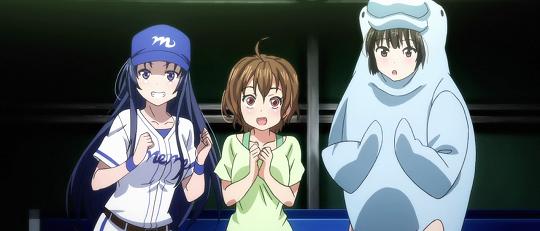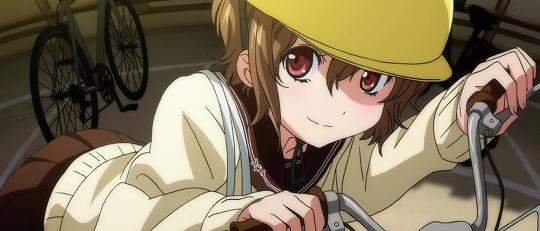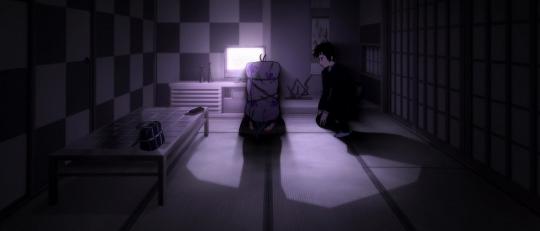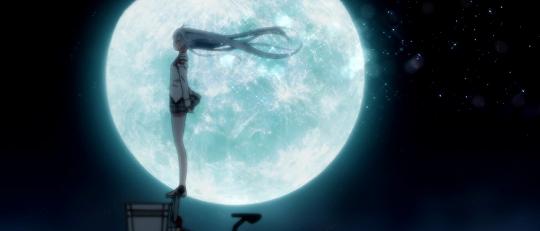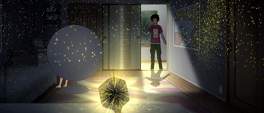Apathy seems to have been a trendy topic for anime the past few years, culminating in 2012 with Hyouka’s Oreki whose, if you’ll forgive the pun, entire driving force was to pursue a languorous existence, free of exertion. Denpa Onna to Seishun Otoko (Electrowave Girl and Youthful Boy / Ground Control to Psychoelectric Girl) may have preceded Hyouka by a year but nevertheless rails against this trend of laziness, ironically doing so in the most languid and nonchalant way possible.
It doesn’t start as such. The first episode is, for the lack of a better phrase, very SHAFT, by which I mean very Shinbo. It’s sparkling, protractedly verbose and cut together with just enough self-assured rough edges to be purposeful.
It’s pretty terrible.
Its nonsense babbling turned me away from the series the first time I tried watching it and very nearly did the second time. Like Nisekoi though, this has many of the tics and traits that one usually attributes to a SHAFT series (Monogatari, Madoka, Zetsubou Sensei et. al.) but none of the bolshy abstractions or obscure nods to dedicated fans, and after the first episode, were it not for the aesthetics, you would be hard pressed to peg this as one of the studios recent offerings. Far more Tsukuyomi than Ef.
The trademark penchant for clean, bold colours is present here with fabulous detail applied whenever a lady’s hair is caught in the breeze. Commence sparkles. This unfortunately doesn’t apply throughout with the lead male Makoto bearing the brunt of the later series corner cutting, present even on the home video release which is when the studio usually takes the opportunity to apply the spit and polish the TV broadcast didn’t have. Regardless, it’s nice to have a series from the studio taking place in believeable locales rather than lost in a geometric and technicolour purgatory. The artistic focus instead is shifted to the ladies then who sport shiny and cherubic faces across the board and generally show a level of, well, animation that other cast members don’t.
Surprising then that this isn’t a harem setup, not in the traditional sense at least. Certainly for a while Makoto is the only XY chromosome carrier and the baffling overtures of Meme, his shrewd and sprightly Aunt, are a concern but at the end of the day there is only one girl who chases after Makoto with romantic interest in mind. Erio, the blue-haired poster child of the series, is his cousin which usually isn’t enough to stop anime turning the fuzzy feelings dial up to 11, however their relationship is played as familial and respectful rather than amorous. She is however the focal point for the first half of the series, Makoto having moved in with his aunt and her when his parents go to work overseas. He finds Erio tie-wrapped in a futon, lounging around the house and curiously absent from school despite the presence of her school uniform.
This storyline - Erio coming out of her literal and metaphorical padded shell and into the harsh world - seems like it represents the entirety of what the series has to offer. Instead, it acts as a teaser for the theme of the second half of the series, that of fighting against apathy and moving forward, however little. I’m fairly certain that’s the theme at least, but given that its applied with such a light touch to such a interestingly constructed plot, it could be all about aliens and espers like the OVA episode implies and I probably wouldn’t know about it.
That’s not a criticism, bludgeoning your audience with messages and analogies is a surefire way to hobble pacing, but the fact that Erio could possibly be an alien and Makoto is inching forward with this life are somewhat lost during the middle third of the series. It’s the same third that neatly slots together a handful of storylines almost without you realising it’s doing it. So although the primary story follows Makoto as he bimbles around town, acting out scenes from ET with Erio; another, meanwhile, is about Ryuushi Ryuuko with her unique outlook getting to know Makoto better; elsewhere still we are introduced to Meme’s daily life, and so on. The trick to this feat of storytelling lies in using its peculiar style - all hidden meanings and knowing phrases - to obscure the grander story playing out. A “grand” story of bottle rockets, infirmed old ladies and a man with a cow tag for an earring. It’s quirky and for the most part it works because the individual stories stand well on their own without knowledge of the others happening concurrently. It also doesn't hurt that the characters have enough personality to steer away from some of the standard anime-romance tropes.
So Ryuushi Ryuuko is willing to put herself out there for Makoto - talking with him on the phone, inviting him to her basketball games - in spite of her own lack of confidence and in contrast to her otherwise idiosyncratic mannerisms. Correspondingly, Maekawa’s stoic and hard to read characteristics juxtapose her weak constitution and outlandish costumes. Fundamentally though it comes down to what the pint-sized spaceman that appears in the closing episodes says: it’s about moving forward if even imperceptibly.
Of course she says it’s moving towards people becoming psychic which ties in with the aliens and espers (oh my!) plot thread that acts as a veneer over all this talk of apathy and self-improvement. It’s an angle that’s not played up all too much after Erio’s role as protagonist wanes but does provide for lovely opening and ending themes, the latter of which sung by the wonderfully eccentric Etsuko Yakushimaru. The finale of the series though, ignoring the OVA only episode, does seem to sneak up on the story which just seems to be spinning up, although it is at least consistent with the episodes that preceded it rather than opting for a grand finale.
It leaves Denpa Onna as a quiet, unconventional but strangely pleasant series that is memorable for more than it’s glittering girls and flowing hair. It gently prods the torpid and lackadaisical side of people - especially teenagers - with the idea that doing something, regardless of the outcome, is better than doing nothing and hiding away. Even if you have to assign a point system to stimulate yourself into doing it.

